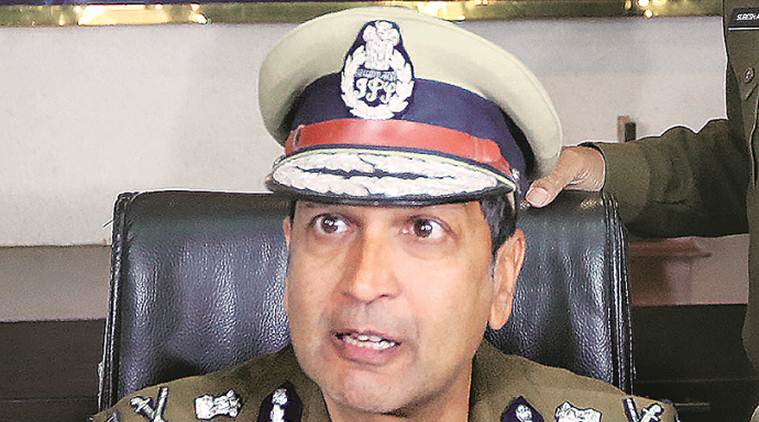
A day after taking over as Punjab DGP, 1987-batch Indian Police Service officer Dinkar Gupta in an interview with The Indian Express underlines the priorities and challenges before him in the border state, which witnessed increase in terror incidents in last four years.
Excerpts
What will be your priorities?
The foremost priority is safe and secure Punjab. In the last four years there has been an increase in terror incidents . There was terrorist attack on Dinanagar police station, terrorist attack on Pathankot Air Force Station and targeted killings. Prevention of such crime will be our key priority. Punjab is a border state, and there are riverine gaps along the border. I will enure that police administration is transparent and accountable. Another focus area is drugs. A lot of work has already been done to tackle drug problem in the state. A lot of recoveries have been made. There are programmes like DAPO (Drug Abuse Prevention Officer) and Buddy to check drug abuse. I will carry all such initiatives forward. We have been successful in neutralising several notorious gangsters and we are committed to check gangsterism. Yesterday only, we had another success when a gangster Ankit Bhadu who was wanted by police force of four states was gunned down.
So, will it strictly be an iron hand against gangsters?
There are various tools in our armoury. My duty as a cop is to prevent crime. It is not that we will use only iron hand to check gangsterism.
How do you see modern day policing?
Policing has become very technical. Prevention and detection in today’s times are big challenges. Anti-national elements are indoctrinating and radicalising the gullible youth through social media. The way people consume information has also undergone a sea change. People today consume information through Internet, WhatsApp, YouTube. These days, criminals change tacks fast. There is dark web, there is deep web – all such platforms are used by the criminals. It is very difficult to keep pace with technology.
What plans do you have in the given scenario?
It is a constant race. We have to keep running. We are trying to adopt new technologies. For example, we gather database of criminals through facial recognition technology using Punjab Artificial Intelligence System. We are also developing other innovative tools. Like I said, it is a constant race.
What is your take on Referendum 2020 campaign spearheaded by US based Sikhs for Justice?
Indian Constitution provides us freedom of expression. There are members of Punjabi diaspora who live in foreign countries. Those countries have granted them rights as per their respective laws. Till the time they (SFJ) use their right of freedom of expression, it is okay. If you cross a line, we will not tolerate it. Law will take its course and legal action will follow. You start committing terrorist attack. Then you cross the line by setting liquor vends afire, like it happened in places such as Nawanshahr and Batala. In one incident, even a vend worker lost his life. Some people living abroad are radicalising gullible youth of Punjab. They are taking advantage of their poverty and illiteracy. We want to make our youth aware so that they don’t fall into this trap. If any youth gets involved in such acts, his life is tossed into an altogether different kind of spin. We are developing the capacity to prevent youth from falling prey to such anti-national elements. We plan to reach out to parents of such youth and our initial efforts have been fruitful. We want to talk to them and tell them that anti-national elements sitting abroad who are trying to radicalise the Punjab youth have their children studying in top educational institutions. Social opinion is against Referendum 2020. Every section is against Referendum 2020. All political parties are united to oppose Referendum 2020.
There is another campaign abroad in favour of UK national Jagtar Singh alias Jaggi Johal, an accused in targeted killings in Punjab?
NIA (National Investigation Agency) carried out investigations in the case. Johal is facing prosecution in NIA court. Indian judicial system is very robust. If someone infringes the law, that person has to face legal action. The recent example is extradition of the accused to India from Canada in Jassi murder case. Yesterday, an accused wanted in two criminal cases in Punjab was extradited from UAE.
Extraditions have been a mixed bag. For example, unsuccessful attempt to seek extradition of British national Paramjit Singh Pamma from Portugal in 2016 (Pamma is wanted in 2009 Rashtriya Sikh Sangat chief Rulda Singh murder case). What is your take?
Extradition is a longish process. It is legally cumbersome and protracted. In some cases, there are delays because the leaders have to be answerable to their constituencies